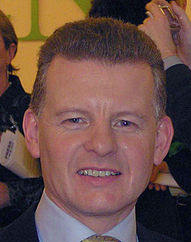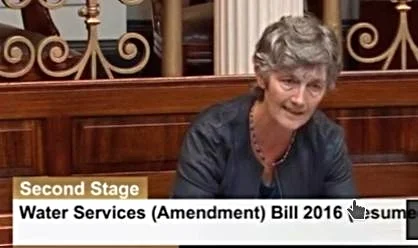What has 1998 got to do with Ireland's present day 'Water Charges' crisis, you might ask?
If a river is polluted you would be advised to investigate the source of contamination. In the case of Ireland's' Water Charges', the problems stem generally from European and international financial pressures to privatise water and charge households for it's supply. This pressure has been put on Ireland ever since joining the European Union in 1973.
In the 1990's the European Union interference and the vacillation of political parties over water charges and privatisation of this resource resulted in widespread public resentment. Public opposition was so great in 1996 that it caused the demise of the 24th Rainbow Government of Fine Gael, Labour Party and Democratic Left, with the result of a new Fianna Fáil/Progresssive Democrats coalition in 1997. One of the new government's promises was to stand up to Brussels and not introduce water charges. Sinn Fein voted for Bertie Ahern as Taoiseach of the new government.
Just before the departure of the Rainbow Government, in December 1996, on the eve of the general election, Brendan Howlin, Minister for Environment announced that they would replace their proposed water charges with a new system in which motor tax collected in each area would be the source for local council funding.
In particular, Ireland's present day water policy is legally bound by the Water Framework Directive 2000-60-EC, (WFD), a European agreement which was agreed and signed in 2000. It has to be said that this piece of environmental legislation is, in the main, worthwhile, especially with regards to it's pollution, preservation and water policy generally. However, problems arose here in Ireland and in Brussels due to the interpretation of the Directive. Depending on political ideology controversy arose mainly around fundingand ownership of water resources. Ireland's objections after the 1997 elections, eventually resulted in the inclusion of Article 9.4, (The Irish Exemption), in the WFD and the acceptance of the principle of 'Subsidiarity' established in the Treaty of Maastricht in 1992.
The following debate Dáil Éireann in 1998 between Emmett Stagg, Labour Party, and Noel Dempsey, Fianna Fáil, and others, epitomises the controversy and shows how Noel Dempsey, the Environment Minister was Ireland's negotiator and signator of the Water Framework Directive.
Noel Dempsey, FF, right, Eamonn Ryan, GP, left
photo: thejournal.ie, Oct 2015 'Noel Dempsey - Every day I regret horrendous decisions we made in Government'
Thursday, 5 March 1998 Dáil Éireann Debate Vol. 488 No. 3
Mr. Stagg asked the Minister for the Environment and Local Government "inthe discussions, if any, he or his officials have had with the EU Commission or its representatives regarding charging for domestic water in Ireland; and if he will make a statement on the matter."
Mr. Dempsey: "The draft EU Water Framework Directive presented by the European Commission in February 1997 provided for full cost recovery for water use, including sewerage services and environmental and resource costs, with some exceptions which would allow for a basic level of domestic water use at an affordable price.
Since the outset, the Commission has been advised of Ireland's opposition to the proposed charging provisions as they relate to domestic consumers. I and officials of my Department have continued to reiterate at every appropriate opportunity Ireland's objections in this regard. In July 1997 I wrote to the EU Environment Commissioner indicating this Government's position on the matter and I stated that we would not reconsider the issue of water charges for Irish consumers. I also made our position known to the UK Minister for the Environment in the course of our discussions on the UK's EU Presidency programme.
We have also maintained our opposition to charging domestic consumers in the course of consideration of the Commission's proposals at meetings at official level preparatory to consideration of the proposals by the Council of Environment Ministers. It is my intention to continue to oppose any provisions which seek to reintroduce charging for domestic uses of water in Ireland.
During discussions on 28 November 1997 in relation to EU Regional and Cohesion funding for infrastructural projects, the Commissioner for Regional Affairs referred to the Commission's decision to reduce the Cohesion aid rate for Irish environmental projects from 85 per cent to 80 per cent on account of the decision to abolish charges for public domestic water supplies and referred to the difficulties created vis-à-vis “the polluter pays” principle. In reply, I reaffirmed and explained the Government's policy on the matter.
At the launch of my Department's 1998 water and sewerage investment programme in Killaloe on 2 February 1998, I reaffirmed to the Commission official present in the clearest possible terms the Government's policy on non-charging for domestic water supplies.
Mr. Stagg: " I welcome the new position adopted by the Minister's party on water charges. My party and I have been opposed to water charges for some time. The Minister will be aware that the previous Government abolished water charges. Can he assure us that, having regard to what is happening in Europe, the Government will not allow the reimposition of water charges?
Mr. Dempsey: "The Deputy said he and his party have always been opposed to water charges. While the Deputy may have held this view for a number of years, it is not clear his party always held that view. It put local authorities in a position where they had to impose these charges.
The Government has not changed its position on water charges. We intend to maintain the position outlined in the programme for Government. Our arguments against water charges are soundly based on the principle of subsidiarity. We believe it is a matter for national Governments to decide whether to impose charges. We are making it clear to the EU that we regard the imposition of charges as in conflict with subsidiary principles."
Mr. Gilmore: I have listened carefully to the Minister's reply to the supplementary from Deputy Stagg and the number of times he has told the Commissioner of the Government'sopposition to the reintroduction of charges. Will he state categorically that domestic householders will not be charged for the use of water and the provision of sewage treatment services because there seems to be some ambiguity between the Government and the Minister, particularly in his reply to Deputy Stagg, that there might be an imposition of charges by the EU?
Mr. Dempsey: " I give an absolute, total, categorical assurance that this Government will continue its opposition to any proposals put forward by the EU Commission. If proposals are put forward and pursued we intend to fight them. Proposals were put forward during the time of the previous Government and, in keeping with its policy, I intend to oppose them."
Mr. Hayes: What is the nature of the discussions the Minister has embarked upon with the European Commission? It appears from his reply there have been three discussions since he took office. Is it the Minister's view that the European Commission sees this as the end of the matter? It has reduced from 85 per cent to 80 per cent the amount of grants made available to some programmes. Will there be further reductions in the various grants?
Mr. Dempsey: As I do not have the gift of foresight, I cannot say whether this is the end of the matter. Since February 1997 the framework directive on water policy, which introduced the concept of charges for water, has been under discussion. The initial position of the Commission was that: “by 20.10 member states shall ensure full cost recovery for all costs for services provided for water uses overall and by economic sector, broken down at least into households, industry and agriculture”. That was its position as outlined on 25 February 1997. There are ongoing discussions on that EU Directive and I expect further discussion on it at the March council meeting.
In respect of the discussions I have had with the Commission, my first contact was in July 1997 when the Commissioner wrote to congratulate me on my appointment as Minister for the Environment and Local Government and requested that I revisit the decision of the previous Government on the position of water charges. I replied thanking the Commissioner for her good wishes and explained fully the Government decision. This was not a discussion but an exchange of letters. The other two occasions have been outlined in the question. When Mr. Verstringer was here and the matter was raised with him at a press conference he made the EU position clear. I availed of the opportunity to reiterate our position in relation to charges. It has been stated by the EU that we are the only member state that does not impose charges for domestic water. That is not the case. In Luxembourg there is opposition in [562] principle to imposing water charges. Its Government ruled out the imposition of water charges three years ago and in Greece there are no charges. We have been arguing on the principle of subsidiarity and from the point of view of social and public health considerations and that it is in conflict with our policy.
Mr. Gilmore: . Will the Minister accept that the cost of providing water is already being met by taxpayers through the general taxation system? Is it not a matter for the Government to decide rather than the European Union seeking to intervene in the manner in which the State collects taxes and recovers charges?
Eamon Gilmor (left), Brendan Howlin (right), Labour Party, source: RTE News, 2016
Mr. Dempsey: " That is our position. I agree with the Deputy that it is a matter for us to decide, in keeping with the principle of subsidiarity, how people should pay for water. The only sector not charged for water is the domestic sector. We have made this point strongly.
We are trying to ensure water charges are not imposed on the domestic sector. I am satisfied we are doing a good job."
Written Answers. - Water Charges.
Thursday, 19 November 1998 Dáil Éireann Debate Vol. 497 No. 1
Trevor Sargent, GP
Mr. Sargent asked the Minister for the Environment and Local Government if he will report on his meeting with Mr. Verstrynge, Environment Deputy Director General of the EU; his views on whether the Government is under renewed pressure to reintroduce domestic water charges from the European Commission; if the new proposed water framework directive will require full application of the polluter pays approach; if the polluter pays principle was enshrined in the Amsterdam Treaty which Ireland ratified"
Mr Dempsey: "At a recent conference on environmental benefits of Cohesion Fund investment in Ireland, I had an informal meeting with Mr. Verstrynge, Deputy Director General of DG XI of the European Commission, at which we discussed a range of matters, including the application of the polluter pays principle in Ireland. I outlined the Government's position in this regard and stated our continued opposition to the reintroduction of domestic water charges.
The current draft of the EU Water Framework Directive, on which common understanding was reached at the Environment Council in June, proposes that member states shall take account of the principle of recovery of the costs of water services in accordance with the polluter pays principle. It would allow member states to have regard, inter alia, to the social, environmental and economic effects of the recovery. The current draft of Article 12 of the directive takes account of the view that it should be a matter for member states to determine charging policy in accordance with the principle of subsidiarity. I stated my intention at the June Council to continue to exempt domestic water services from water charges.
The polluter pays principle is enshrined in Article 34 of the Amsterdam Treaty which amends the terms of Article 130r of the Maastricht Treaty."
Source: Dail Question-Water Charges March 1998
Written Answers -Water Charges Nov 1998






